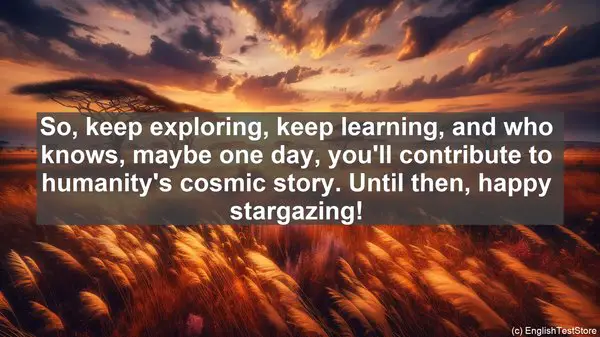Introduction: The Language of Space
Today, we’re diving into the fascinating world of space exploration and astronomy. But before we embark on this celestial journey, let’s equip ourselves with the right words. In this lesson, we’ll be exploring the top 10 verbs that are essential for discussing anything related to space. So, whether you’re a student or a space enthusiast, get ready to expand your vocabulary!
1. Observe: Gazing at the Cosmos
Observation is the foundation of any scientific endeavor, and it’s no different in space exploration. Astronomers observe celestial objects, capturing their beauty and studying their behavior. From the comfort of their observatories or even through space telescopes, they meticulously record data, helping us unravel the mysteries of the universe.
2. Explore: Venturing into the Unknown
Space is the ultimate frontier, and exploration is at the core of our human nature. Astronauts, equipped with advanced technology, embark on missions to explore distant planets, moons, and even asteroids. They push the boundaries, collecting samples, and conducting experiments, all in the pursuit of knowledge.
3. Discover: Unveiling the Secrets
Every space mission holds the promise of discovery. Whether it’s a new exoplanet, a previously unknown phenomenon, or a deeper understanding of the cosmos, each revelation is a step forward. Scientists pore over the data, analyzing and interpreting, often leading to groundbreaking insights.

4. Communicate: Sharing the Wonder
The wonders of space are meant to be shared. Scientists, astronauts, and educators play a crucial role in communicating their findings and experiences. Through articles, lectures, or even social media, they bring the marvels of the universe closer to us, inspiring the next generation of space enthusiasts.
5. Collaborate: Joining Forces
Space exploration is a global endeavor, often requiring collaboration between nations. From joint missions to shared data, the spirit of cooperation is evident. By pooling resources, expertise, and perspectives, we can achieve more, advancing our understanding of space at an accelerated pace.
6. Analyze: Decoding the Data
In the vast expanse of space, data is the currency of knowledge. But raw data alone is not enough. Scientists employ sophisticated techniques, from statistical analysis to computer modeling, to extract meaningful insights. It’s through this meticulous process that patterns emerge and theories take shape.

7. Innovate: Pushing Technological Boundaries
Space exploration has always been a catalyst for innovation. From the early days of rocketry to the development of cutting-edge instruments, the challenges of space have spurred technological advancements. Many of these innovations find applications beyond space, benefiting various industries on Earth.
8. Preserve: Safeguarding Our Cosmic Heritage
Space is a delicate ecosystem, and as we venture further, it’s crucial to preserve its pristine nature. Concepts like planetary protection ensure that we don’t inadvertently contaminate other celestial bodies with Earth’s organisms. By being responsible explorers, we can safeguard the integrity of our cosmic neighborhood.
9. Inspire: Igniting the Imagination
Space has always captivated the human imagination. From the ancient myths to modern science fiction, it’s a realm of endless possibilities. By sharing the stories, the images, and the dreams, we not only inspire wonder but also nurture the next generation of scientists, engineers, and explorers.
10. Persist: The Journey Continues
Space is vast, and our understanding of it is ever-evolving. Every mission, every discovery is a stepping stone, but it also opens up new questions. The pursuit of knowledge is a lifelong journey, and as we stand on the precipice of a new era of space exploration, the possibilities are truly infinite.
